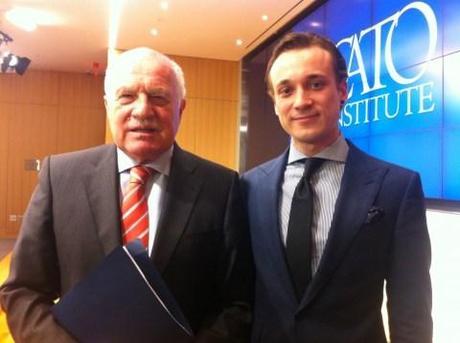
Maksim Karliuk is a CIPE-Atlas Corps Think Tank LINKS Fellow serving at the Cato Institute.
Before coming to the U.S. for the Think Tank LINKS Fellowship, I presumed I would only be engaged with U.S.-based affairs (including political, economic, and regulatory issues). This was dictated by my general interest in these issues, but also by my desire to study how things work in practice in the United States so I could bring back practical lessons to my home country.
However, since my Think Tank LINKS fellowship started in January, I have found myself going almost exclusively to conferences, presentations, and panel discussions on European affairs. Many of the events feature prominent European and American speakers. The latest events I attended were with Madeleine Albright at Georgetown University Mortara Center for International Studies, where the former U.S. Secretary of State presented her new book, Prague Winter; the EU crisis discussion featuring former president of the Czech Republic Václav Klaus at the Cato Institute; a talk on the Transition in Central and Eastern Europe at the Woodrow Wilson Center for Scholars; and a presentation of a book on the Economics and Culture of Transition in Central Europe by the former Minister of Finance of Hungary Lajos Bokros. On its way is a talk on Portugal and the Euro Area with Portuguese Minister of State and Finance Vítor Gaspar at the Brookings Institution.
There is always an opportunity to engage in discussions at these events by publicly asking questions, or by having personal conversations with the speakers and many professionals that attend the events. I was happy to personally discuss one of my current research interests regarding the Eurasian economic integration process with Václav Klaus (hopefully) without any politically sensitive constraints. Klaus is generally very critical of integration processes which go beyond establishing free trade. In this respect he is a pronounced critic of the EU. In his view the Eurasian integration, which has seen the creation of the Customs Union and a Common Economic Space between Belarus, Kazakhstan and Russia, and heads to create the Eurasian Economic Union, is no different.
However, he agreed that this integration could be particularly beneficial for Belarus for the following reasons: it is a chance for a generally closed Belarusian economy to open up the market to the integration partners and outer world; it will bring international norms and standards into the national regulatory framework which will stimulate free trade (through accession to international treaties and legal harmonization practices); and it will provide the possibility to stimulate accession to the World Trade Organization. While there are signs that free trade is being established already between the Eurasian nations, it still has to be seen if the commitments will be fulfilled in full by the partner countries and whether the Eurasian integration process will not just be a political project with no viable economic results.
Generally speaking, events about Europe held in the U.S. have their particular importance and added value because the views of American specialists and scholars are often not present at similar events back in Europe. This certainly enriches discussions and offers me a chance to look at things from another angle and challenge my previously held opinions and approaches. I look forward to continue participating in more discussions to enrich my research with new challenging ideas.
CIPE Atlas Corps Think Tank LINKS Fellowship brings talented young professionals with strong research backgrounds to shadow researchers and experts at leading U.S. think tanks for six month. Maksim Karliuk is part of the inaugural class, serving at the Cato Institute.

